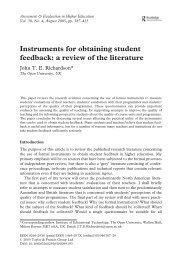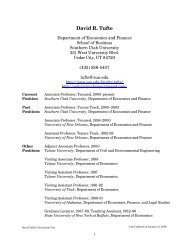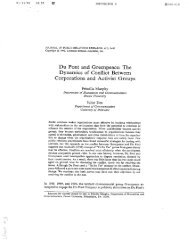Jeffrey Barnes: Self-Evident Truths - Southern Utah University
Jeffrey Barnes: Self-Evident Truths - Southern Utah University
Jeffrey Barnes: Self-Evident Truths - Southern Utah University
Create successful ePaper yourself
Turn your PDF publications into a flip-book with our unique Google optimized e-Paper software.
APPENDIX III<br />
FOUR MAJOR ETHICAL DECISION-MAKING PRINCIPLES<br />
Categorical Imperative. Immanuel Kant (1724-1804)wrote a small treatise on ethics<br />
entitled, “Groundwork of the Metaphysics of Morals.” He is considered the greatest<br />
philosopher of the German Enlightenment. He was born in East Prussia in 1724 and was<br />
a significant influence on Western philosophy. He believed that the use of reason could<br />
find a consistent, nonoverridable set of moral principles. (Pojman, 2002: page 138) A<br />
categorical imperative is a decision to perform an act that is based on a moral law no less<br />
binding than such laws of nature as gravity. “Categorical” here means unconditional,<br />
without any question of extenuating circumstances, without any exceptions. Right is<br />
right and must be done even under the most extreme conditions.<br />
Utilitarianism. As a moral philosophy, utilitarianism begins with the work of Scottish<br />
philosophers Frances Hutcheson (1694-1746), David Hume (1711-1776), and Adam<br />
Smith (1723-1790) and comes into its classical stage in the writings of English Social<br />
reformers, Jeremy Bentham (1748-1832) and John Mill (1806-1873). They are the<br />
nonreligious ancestors of the twentieth-century secular humanists, optimistic about<br />
human nature and our ability to solve our problems without recourse to providential<br />
grace. (Pojman, 2002: page 108) Utilitarianism seeks to maximize the greatest good for<br />
the greatest number of people. Utilitarianists want to “maximize value or minimize loss.”<br />
Various consequences are considered and the impact of the consequences of one action is<br />
weighed in relation to the consequences of another course of action. The famous saying,<br />
“The ends justify the means,” is based upon utilitarian principles.<br />
Hedonism. Hedonism comes from the Greek word, hêdon, meaning pleasure.<br />
Hedonism, at its core, is closely related to the philosophies of Nihilism and Narcissism.<br />
Aristippus (435-366 BC), a student of Socrates, was the founder of the ethics of pleasure.<br />
Aristippus believed that persons should, “act to maximize pleasure now and not worry<br />
about the future.” Aristippus, however, referred to pleasure of the mind-intellectual<br />
pleasures. “While he believed that men should dedicate their lives to pleasure, he also<br />
believed that they should use good judgment and exercise self-control.” His famous<br />
phrase is, “I possess, I am not possessed.” Following Aristippus is Epicurus (342-270<br />
BC). Modern usage of the Hedonism philosophy, however, has ignored his original<br />
intent. Phrases such as, “eat, drink, and be merry, for tomorrow we die,” “live for today,”<br />
and “don’t worry, be happy,” are present examples of the Hedonism philosophy.<br />
Golden Mean. Aristotle’s Golden Mean philosophy refers to finding a middle ground, a<br />
compromise between two extreme points of view or actions. Formulated around the 4 th<br />
century BC, in Greece, taking the middle way does not involve a precisely mathematical<br />
average, but is an action that approximately fits that situation at the time. “The mean is<br />
not only the right quantity, but at the right time, toward the right people, for the right<br />
reason, and the right manner.”<br />
Some of these philosophies might be used in the Potter’s Box.<br />
Page 25 of 33
















